News
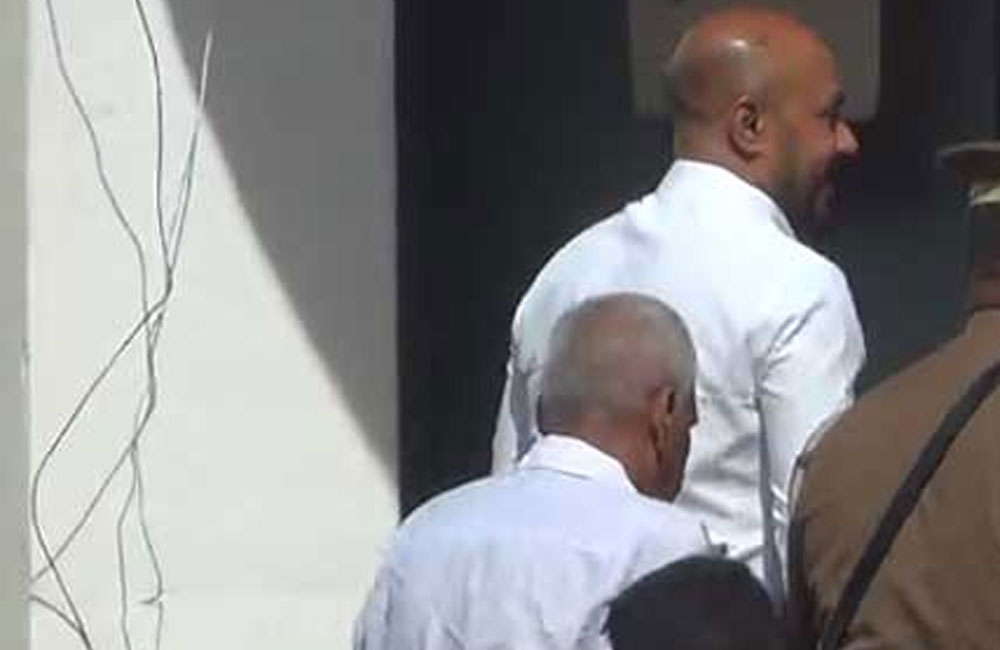
Ex-Minister Duminda Dissanayake Remanded
Former Minister Duminda Dissanayake has been remanded until June 26 following his appearance before Mount Lavinia Magistrate Chathurika de Silva earlier today.
The remand order comes in connection with an ongoing investigation into the discovery of a gold-colored T-56 assault rifle found in a luxury apartment complex in Wellawatte.
Authorities have filed charges against Dissanayake, linking him to the unauthorized possession of the weapon.
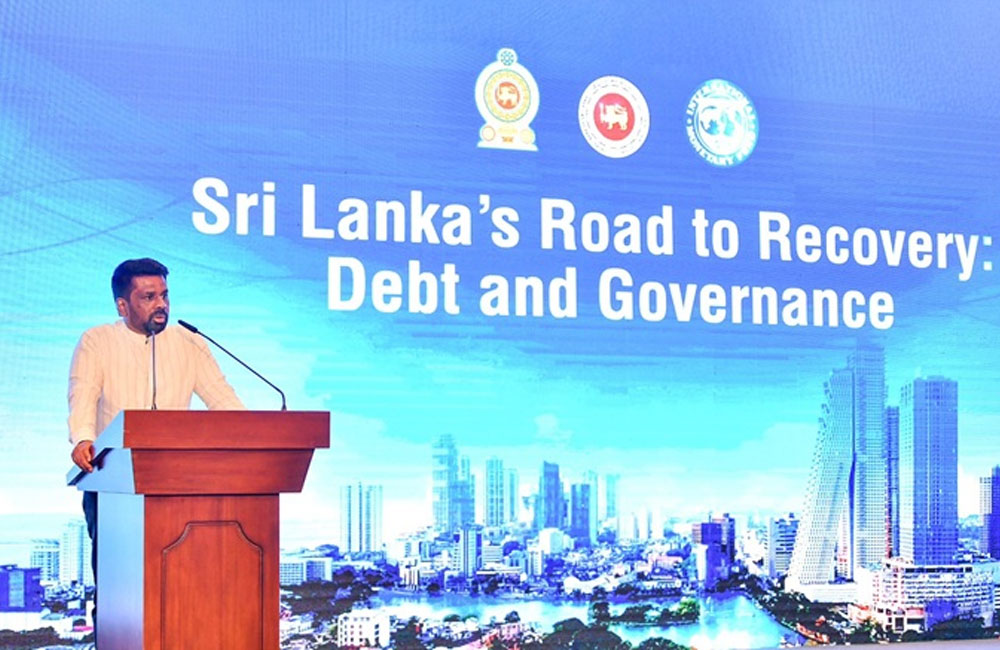
SL will meet external debt obligations independently by 2028 – President
President Anura Kumara Dissanayake says by 2028, the government will have laid the foundation for a stable and self-reliant Sri Lankan economy, one capable of meeting its external debt obligations independently.
The President emphasised that true sovereignty cannot exist amidst economic collapse, reaffirming that the government’s ultimate goal is to restore national sovereignty through economic stability and self-reliance.
President Dissanayake further called upon all public officials and citizens to actively contribute to this national effort, highlighting that the ongoing reform process requires a collective and sustained commitment from everyone.
The President made the remarks today while delivering the keynote address at the international conference “Sri Lanka’s Road to Recovery: Debt and Governance” in Colombo.
This landmark conference was jointly hosted by the Ministry of Finance, the Central Bank of Sri Lanka, and the International Monetary Fund (IMF).
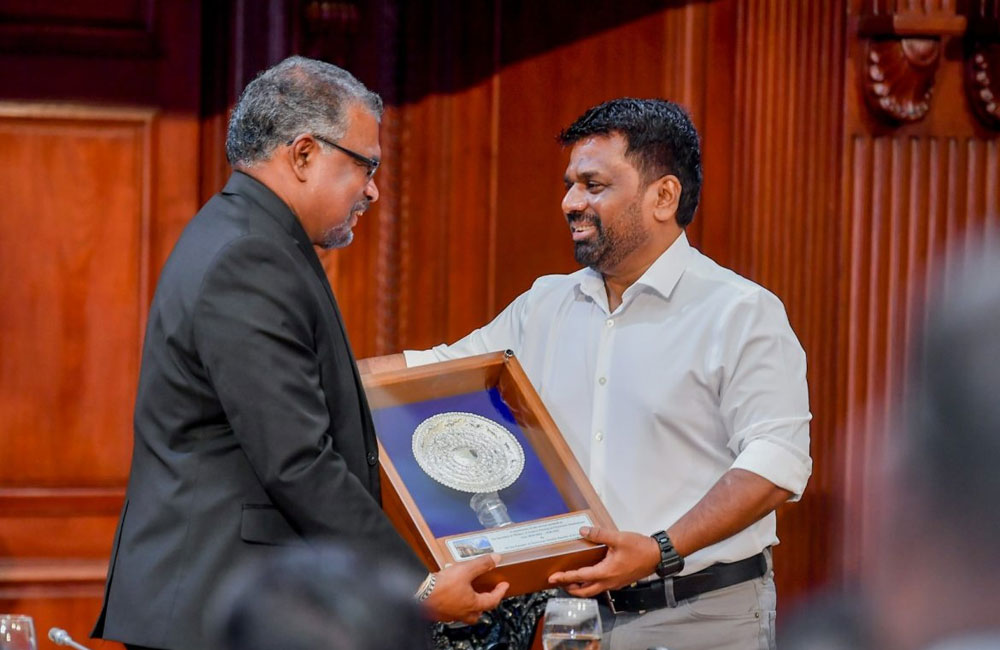
President Commends Outgoing Treasury Secretary
President Anura Kumara Disanayake lauded Mahinda Siriwardana, the outgoing Secretary to the Treasury, for his exemplary service, stating that it is the responsibility of public officials to strive to prevent adverse outcomes and contribute to positive change.
The President particularly commended Siriwardana’s exceptional dedication and commitment in expertly navigating the nation’s economy through the transformative period following the recent economic crisis, ultimately achieving significant economic victories for the country.
President Disanayake expressed his gratitude for Siriwardana’s invaluable contributions.
These remarks were made by President Disanayake at a farewell ceremony organised at the Presidential Secretariat this morning (18) to mark Siriwardana’s retirement from his post as Secretary to the Treasury.
The President highlighted the need for a new value system focused on individual merit in an era where material possessions often overshadow genuine human values.
He stressed that the country requires a public service driven by humanity and empathy towards others, fulfilling its duties rather than one marred by excessive consumerism and corruption.
President Disanayake further emphasised that the public service should not be an inaccessible mechanism aloof from citizens. He underscored the importance of considering the impact of decisions on people’s lives when making policy choices. The President concluded by stating that young public officials have much to learn from the distinguished career of Mahinda Siriwardana, a senior public servant with extensive experience and profound understanding.
In his address, Siriwardana described his three-year tenure as Secretary to the Treasury as the most significant period of his professional life.
He thanked the President for maintaining confidence in him and allowing him to continue in the position despite a change in government leadership, noting that the President’s support was a great source of strength. Siriwardana added that the country might not have overcome its economic crisis without President Anura Kumara Disanayake’s faith, resilience and boundless dedication.
During the ceremony, the President also presented Siriwardana with a commemorative token in appreciation of his outstanding service.( PMD)
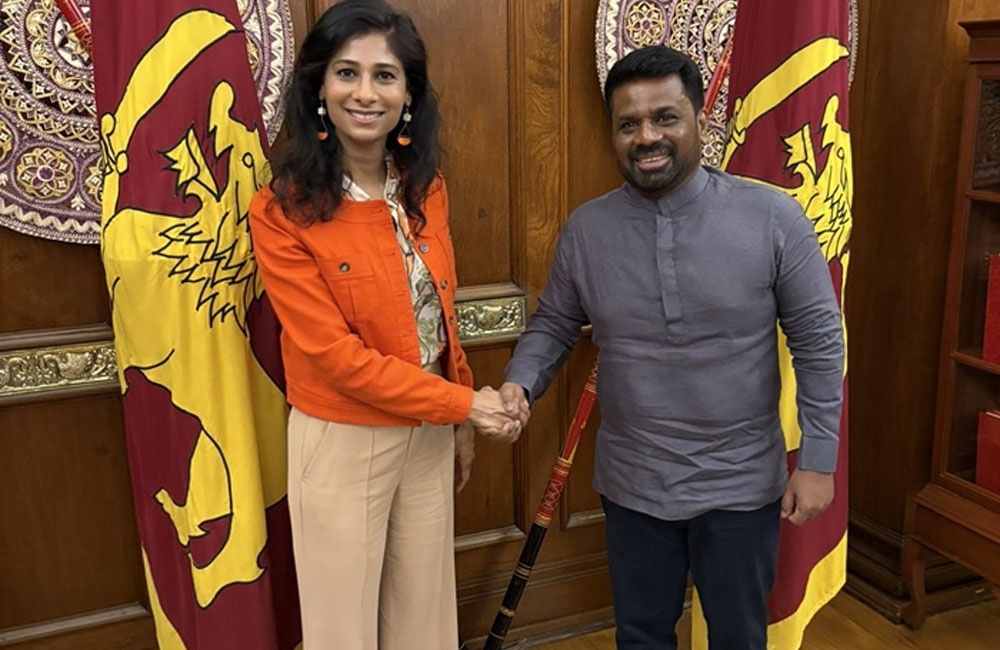
Sri Lanka Must Stay the Course on Reforms: IMF's Gita Gopinath
Gita Gopinath, First Deputy Managing Director of the International Monetary Fund (IMF), met with Sri Lankan President Anura Kumara Dissanayake in Colombo today (16) to discuss the country’s ongoing economic reform program.
The meeting took place during her two-day official visit, which coincides with a high-level conference titled “Sri Lanka’s Road to Recovery: Debt and Governance”.
“We discussed Sri Lanka’s strong performance on economic reforms and the importance of maintaining momentum,” she noted.
She emphasized the importance of maintaining reform momentum, noting that “continued commitment is vital for lasting stability and prosperity for all Sri Lankans.”
The visit marks the first time since 2005 that a serving IMF Deputy Managing Director has visited Sri Lanka.
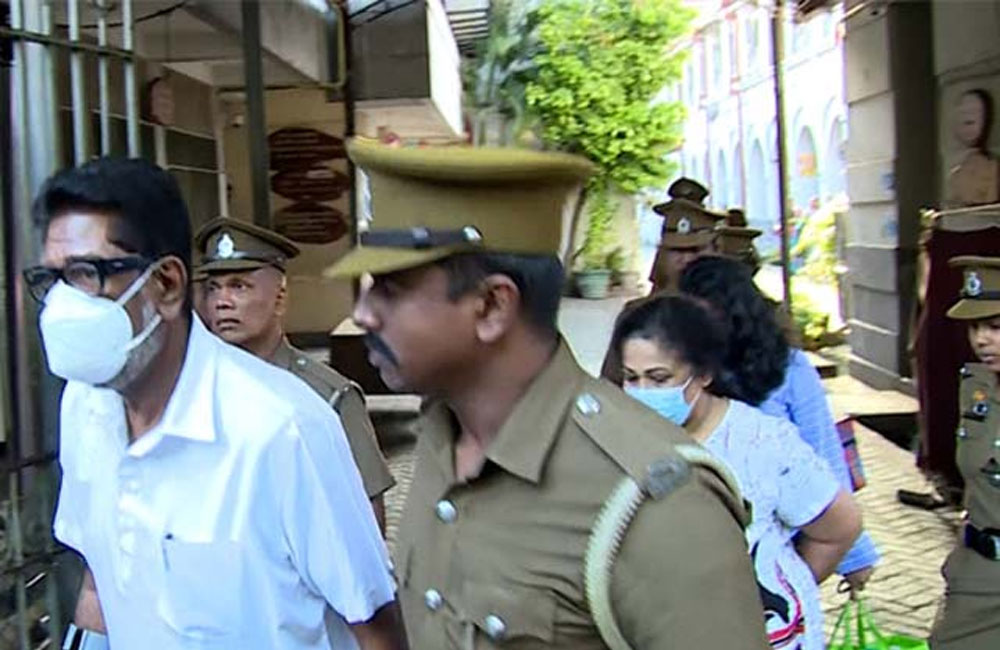
Bail granted, Yet remanded – Keheliya’s family misses compliance
Former Health Minister Keheliya Rambukwella, his wife, and daughter, who were arrested and released on bail earlier today, have been remanded for failing to fulfil bail conditions.
The Colombo Magistrate’s Court granted bail to the three individuals who had been arrested by the Bribery Commission earlier today.
Rambukwella, his wife, and daughter had appeared before the Bribery Commission to provide statements with regard to investigations into their assets.
Thereafter, they were arrested and produced before the Colombo Magistrate’s Court, after which they were ordered to be released on bail.
Colombo Magistrate Thanuja Lakmali had ordered them to be released on Rs. 50,000 cash bail and 09 sureties of Rs. 05 million.
However, due to their inability to fulfil the bail conditions, Keheliya Rambukwella, his wife, and daughter have been placed under remand.
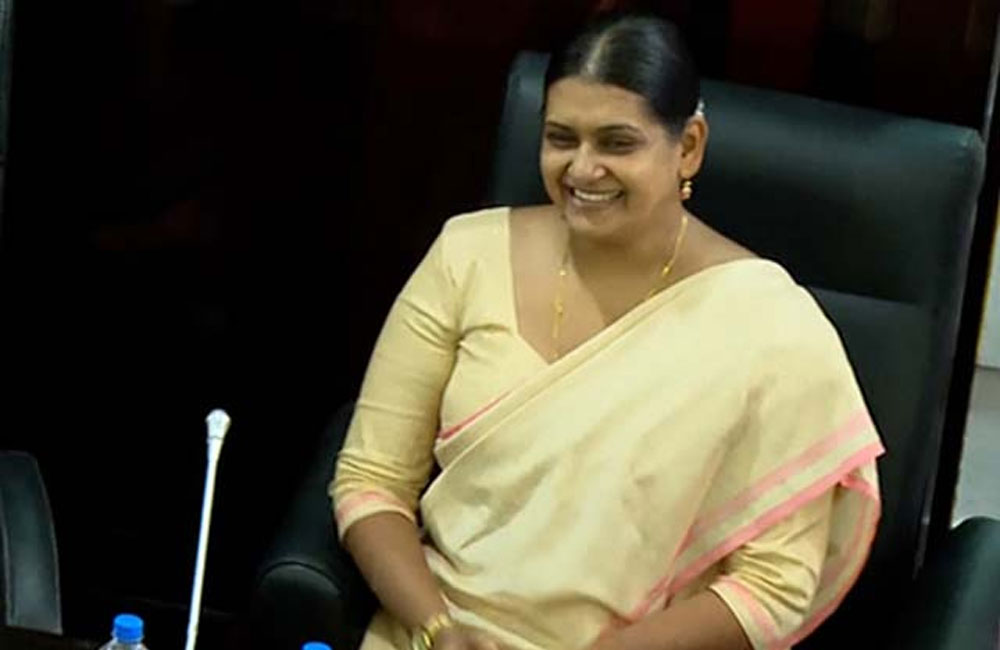
Vraîe Cally Balthazaar Elected Colombo Mayor
In a closely watched and hotly debated vote, Vraîe Cally Balthazaar of the National People’s Power (NPP) has been elected as the new Mayor of Colombo, securing 61 votes in a secret ballot held during the inaugural session of the Colombo Municipal Council.
Balthazaar defeated Riza Zarook of the Samagi Jana Balawegaya (SJB), who received 54 votes. Two votes were rejected.
The election followed intense discussions among council members over whether the vote should be conducted openly or by secret ballot. After more than an hour of deliberation, consensus was reached to proceed with a secret vote.
The Colombo Municipal Council, comprising 117 members, saw the NPP emerge as the largest party with 48 seats in the May 6 local government elections.
However, it lacked an outright majority.
The inaugural session was presided over by Western Province Commissioner of Local Government, Sarangika Jayasundara. According to council procedure, the first order of business was the election of the Mayor.
Balthazaar’s election marks a significant milestone for the NPP and for Colombo’s political landscape, as she becomes one of the few women to hold the city’s top municipal office.
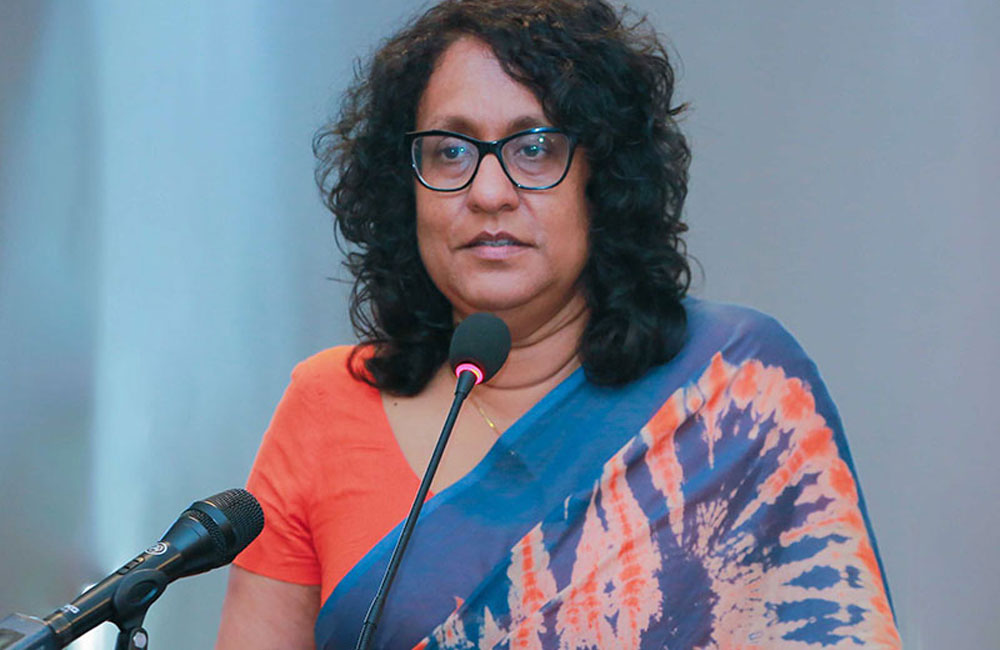
“Childcare is not solely a women’s issue” – PM Harini
Prime Minister Dr. Harini Amarasuriya emphasised that childcare is not solely a women’s issue as it is an economic and policy issue. She said that enabling women to balance work and caregiving is not only the right thing to do, but also essential for economic progress.
The Premier made these remarks while participating in a World Bank Group event titled Childcare as an Enabler of Women’s Increased Economic Participation in Sri Lanka, held today (17) at Cinnamon Life Hotel, Colombo, according to the Prime Minister’s Media Division.
The roundtable mainly focused on how opportunities can be granted to women to thrive in the workforce while contributing to the nation’s economy through childcare services.
Delivering the keynote address, Prime Minister Dr. Harini Amarasuriya highlighted that women are central to the economy through both paid and unpaid contributions. However, barriers continue to restrict their workforce participation.
It is true that women’s labour force participation in Sri Lanka stands at only 32%, significantly lower than men’s participation at 74%. However, this statistic fails to capture the full scope of women’s economic contributions, as unpaid work by women is not statistically included.
Closing the gender gap could increase Sri Lanka’s GDP by up to 20%, as this is not just a social goal; it is an economic strategy that strengthens family well-being and national development.
The Sri Lankan government has taken steps such as Early Childhood Development (ECD) programs through the Ministry of Women and Child Affairs to expand childcare services in order to support women in the workforce, the statement said.
The Prime Minister further stated that tax incentives are being provided to businesses offering child protection services, economic assistance is being granted to working families, and a National Child Protection Framework is already in operation to ensure the quality of such services. Furthermore, she emphasized that public-private partnerships are crucial in expanding the provision of these services.
The Prime Minister appreciated the World Bank’s support in this regard.
The event was attended by the Secretary to the Ministry of Women and Child Affairs, K.D.R. Olga, Gevorg Sargsyan, World Bank Group Country Manager for Sri Lanka, and representatives from the government, private sector, civil society, and officials from the World Bank Group.
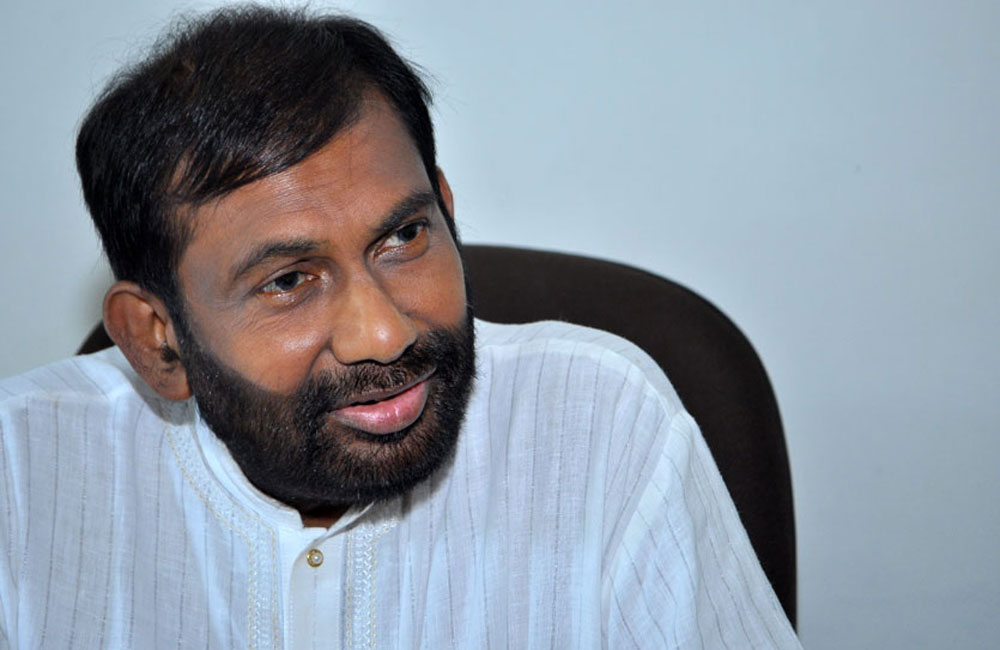
Former minister’s assets to be auctioned over loan default
The Colombo Commercial High Court has ordered the public auction of three companies reportedly linked to former State Minister Daya Gamage, to recover an outstanding sum owed to People's Leasing and Finance PLC.
According to a public notice issued by the Registrar and Deputy Fiscal of the High Court, the auction is scheduled for July 2 at 10 a.m.
The companies listed for auction are Daya Group Limited, Daya Apparel Exporter (Pvt) Ltd, and Olympus Construction (Pvt) Ltd.
The auction is being conducted to recover a balance of Rs. 104,229,342, as per a court judgment delivered on November 10, 2022.
Since the respondents have so far paid Rs. 4,080,000 from the total sum of Rs. 108,309,342 owed to the finance company, the remainder is now being sought through the sale of the companies' assets under court order.
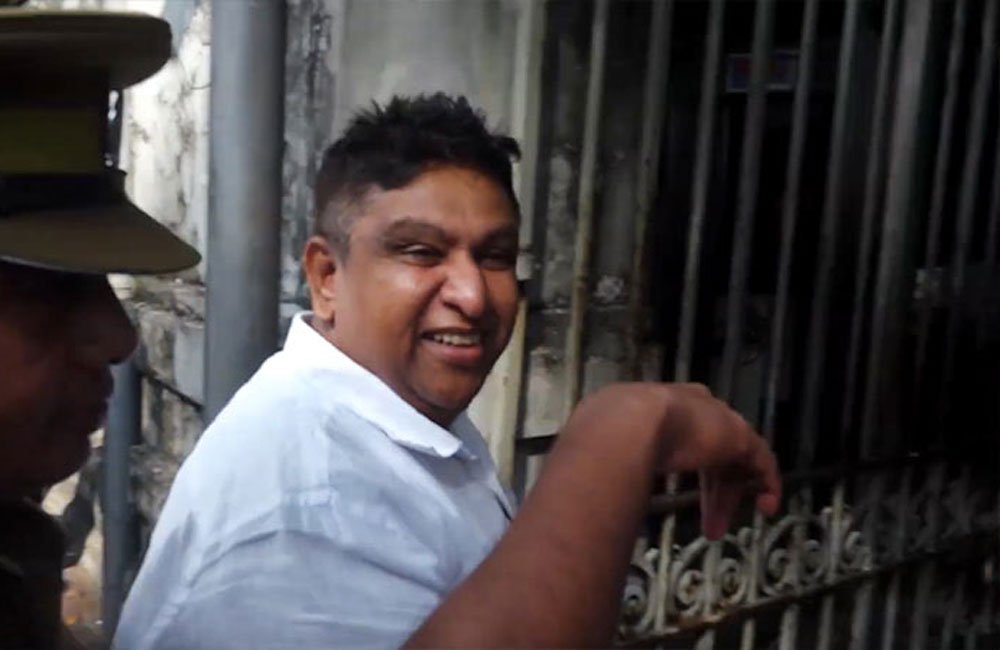
Chamara Sampath to Face Court Again Over Rs 17.3M Fund Misuse
The Colombo Magistrate’s Court has ordered Member of Parliament Chamara Sampath Dassanayake to reappear on November 16, 2025, in connection with three cases related to alleged financial misconduct during his tenure as Chief Minister of Uva Province.
The cases were heard today before Chief Magistrate Tanuja Lakmali Jayasinghe, who issued the summons following a review of the charges.
According to the allegations, Dassanayake is accused of prematurely withdrawing funds from six fixed deposit accounts belonging to the Uva Provincial Council, causing a financial loss of approximately Rs 17.3 million to the government. The deposits were reportedly held in a state-owned bank and withdrawn before their maturity dates.
The Commission to Investigate Allegations of Bribery or Corruption arrested Dassanayake on March 27, 2025, in connection with the case. He was subsequently remanded and later released on bail on April 8, 2025.
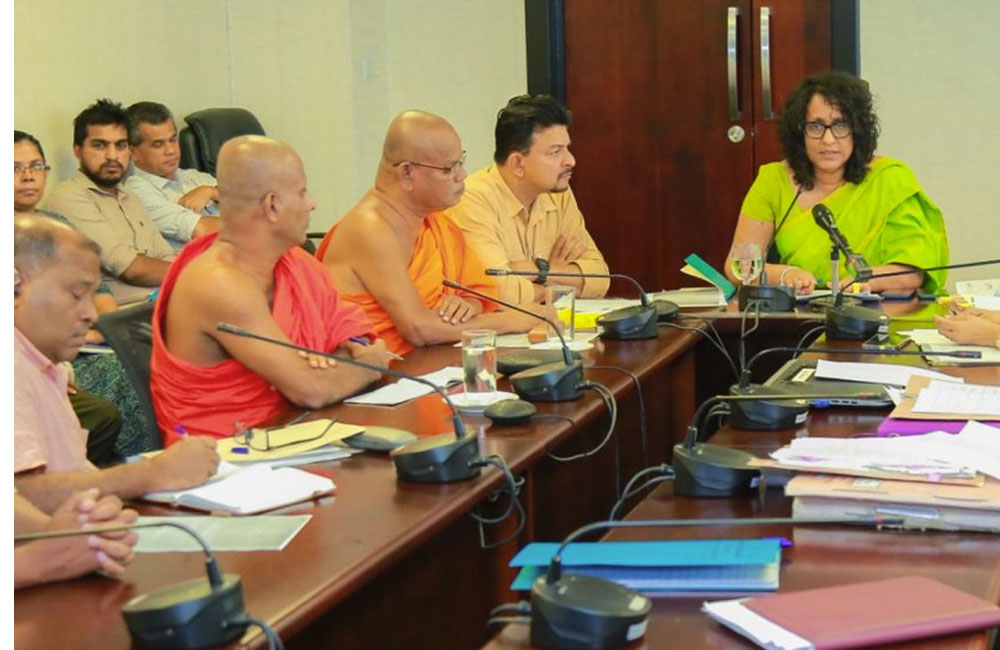
Govt to review Standards of Educationist Degrees from Private Universities
Prime Minister Dr. Harini Amarasuriya says the Ministry has launched a formal review into the quality of educationist degrees awarded by private universities and affiliated higher education institutes in Sri Lanka.
She stated that issues have arisen concerning the qualifications of graduates with educationist degrees from these institutions, particularly regarding their eligibility and suitability for recruitment into the Sri Lanka Teachers’ Service.
The Minister made these comments on June 14 during a meeting with representatives of teacher and principal unions at the Ministry of Education premises in Isurupaya.
Dr. Amarasuriya further clarified that recent teacher appointments were done in line with prevailing teacher service regulations as they had been been approved by the previous Government.
However, she emphasized that the quality and credibility of educationist degrees—especially from government-approved private universities—are now under renewed scrutiny by the Ministry.
She noted that future recruitments to the Teachers’ Service would be guided by the outcomes of this quality review.
The meeting was also attended by Deputy Labour Minister Mahinda Jayasinghe, Acting Education Ministry Secretary Amal Edirisuriya, and senior ministry officials.
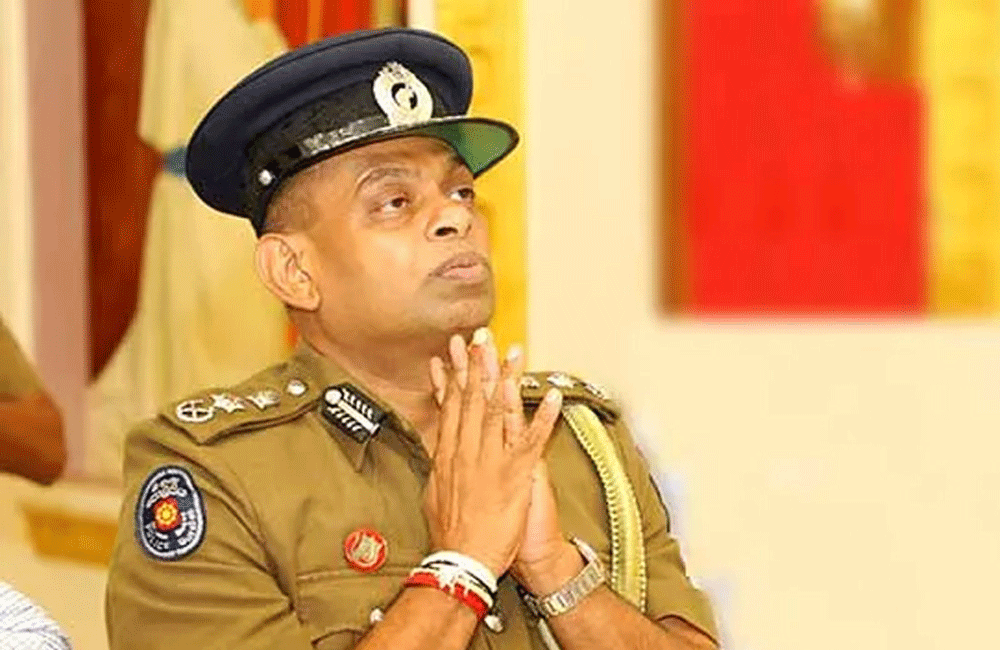
Deshabandu To Face Daily Grilling Over Abuse of Power
The high-level Committee of Inquiry investigating allegations of gross abuse of power by suspended Inspector General of Police (IGP) Deshabandu Tennakoon will commence daily hearings starting today.
The committee, chaired by Supreme Court Justice P. P. Surasena, includes Justice W.M.N.P. Iddawela and National Police Commission Chairman E.W.M. Lalith Ekanayake.
This follows a series of preliminary sessions and the submission of affidavits by the Attorney General’s Department, with formal hearings now underway.
The inquiry comes from serious allegations of misconduct during Tennakoon’s tenure, prompting Parliament to pass a resolution under the Removal of Officers (Procedure) Act No. 5 of 2002 2.
IGP Tennakoon is expected to appear before the committee at 9:30 a.m. today (16), continuing a process that began with his initial appearance in May.
The Attorney General’s Department, represented by senior legal officers, has already submitted key evidence, while Tennakoon’s legal team has also made presentation to the committee.
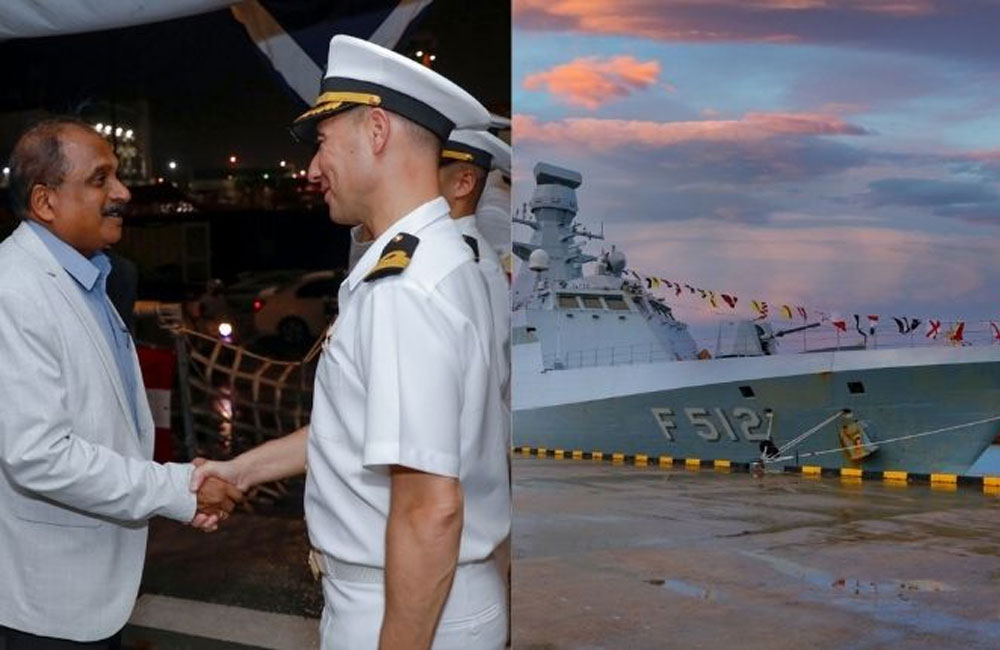
Sri Lanka, Türkiye reaffirm defence ties during Turkish Navy ship visit
Acting Defence Minister Maj. Gen. (Retd) Aruna Jayasekara visited the Turkish Navy ship TCG Büyükada (F-512) on June 13, where he was welcomed by Turkish Ambassador Semih Lütfü Turgut and the ship’s commanding officer.
In his address, Jayasekara highlighted the visit as a sign of growing defence ties and maritime cooperation between Sri Lanka and Türkiye.
He also held discussions with Turkish defence officials on strengthening bilateral military collaboration. The visit included a tour of the vessel, attended by senior naval officers and diplomatic representatives.
Page 139 of 681